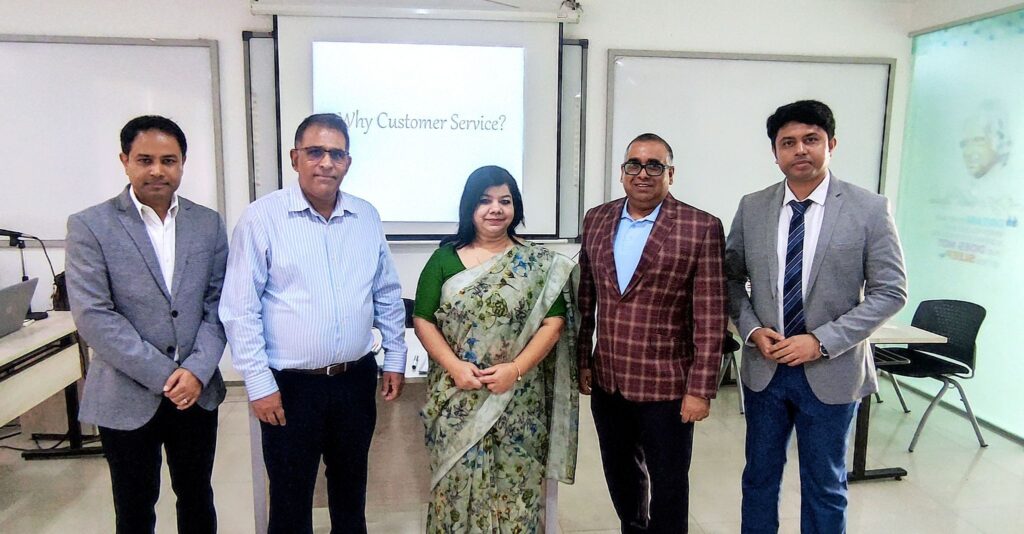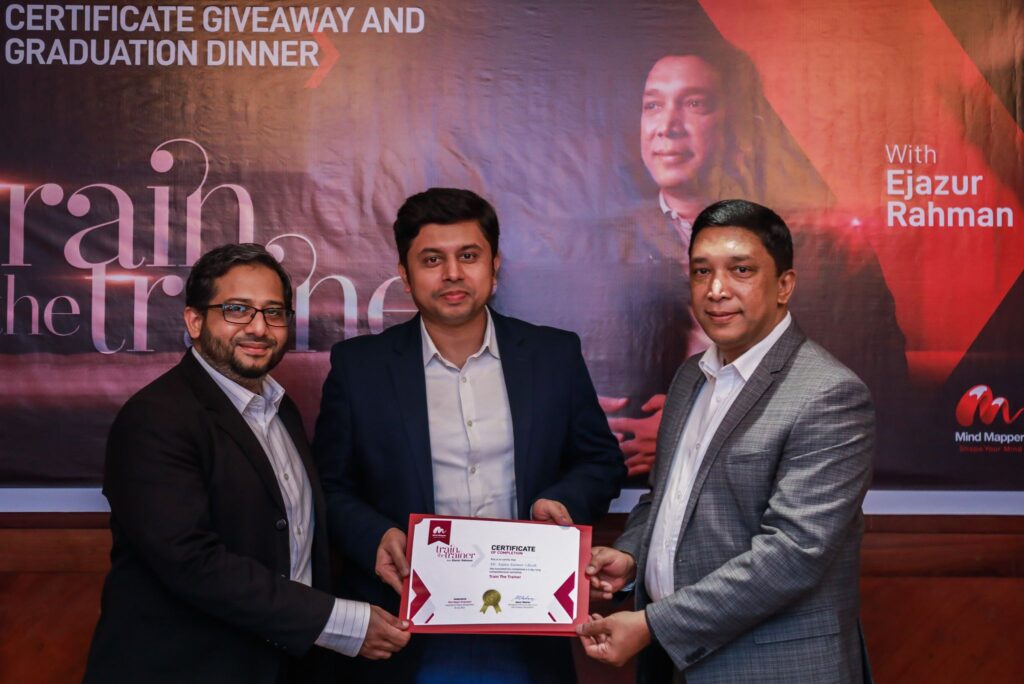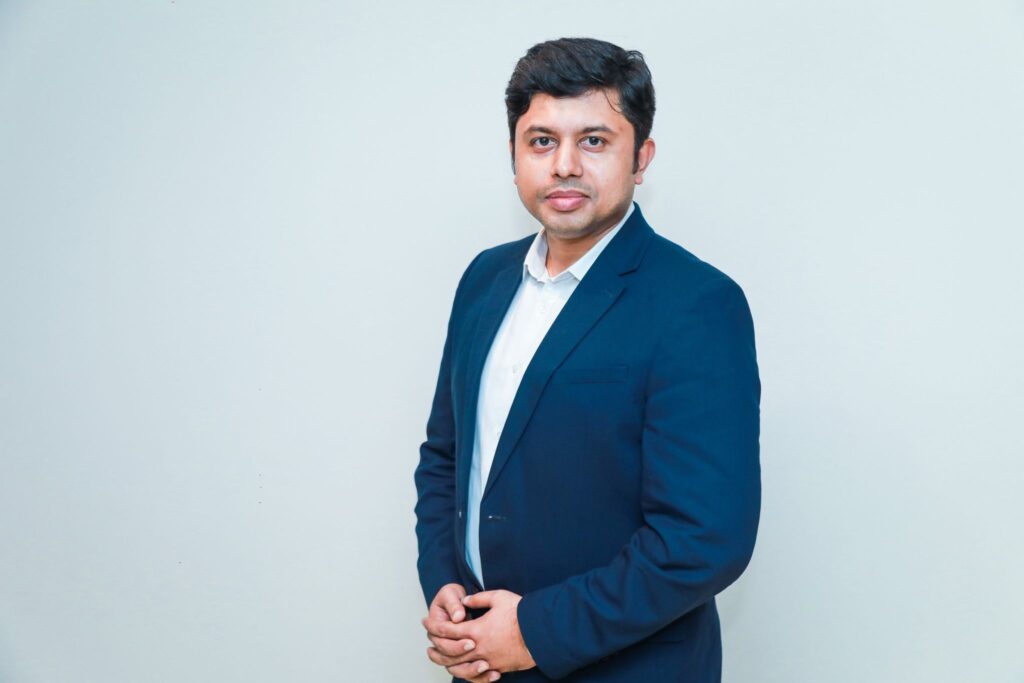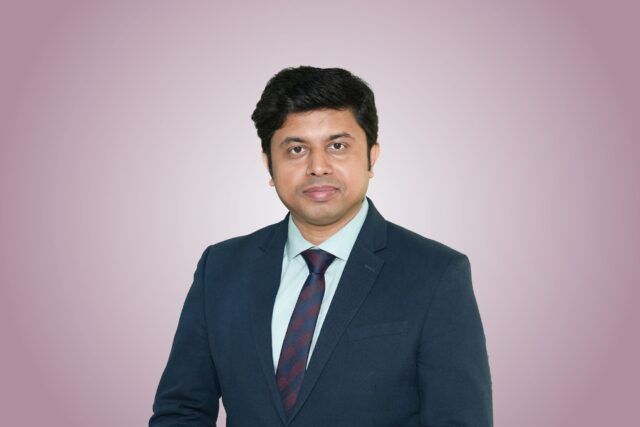Sujan K. Ghosh
Assistant Vice President and Learning & Development Manager
Dhaka Bank Limited
Mr. Sujan K. Ghosh is a seasoned professional with over fifteen years of experience in Training Management, Learning & Development, and Research & Consultancy. Currently, the Assistant Vice President and Learning & Development Manager at Dhaka Bank Limited, he holds a Master’s degree from North South University. Mr. Sujan is a global certified Learning & Development Professional, adept at designing engaging online courses. His expertise includes extensive work in the banking sector, notably at the Bangladesh Institute of Bank Management (BIBM). Passionate about staying updated, Sujan actively engages with professional associations like ATD and WSDA, reflecting his commitment to ongoing learning and development.
Let’s learn about his journey.
The InCAP: Mr. Sujan K. Ghosh, please share your professional and academic peregrination for our readers!
Mr. Sujan K. Ghosh: As a performance driven professional, I have around fifteen years of combined experience in Training Management, Learning & Development and Research & Consultancy. Currently, I am working as Assistant Vice President at Dhaka Bank Limited. At present, I am positioned as Learning & Development Manager at Dhaka Bank Training Institute [DBTI]. Before that I served at Bangladesh Institute of Bank Management (BIBM) for thirteen years. In 2018, I participated the Leadership Energy Summit Asia (LESA 2018) in Malaysia. The summit consisted of speeches by the well-known speakers Richard Quest from CNN News; inspiring speeches by Stephen M.R. Covey and many more. Earlier in 2015, I joined as part of organizer in the Bangladesh Banking Summit organized by Fleming. Co. and BIBM. I did Masters from North South University (NSU) and Bachelor (Hons.) from Khulna University. In 2013, I joined and presented paper in the ‘2nd International Workshop on Inclusive Finance: Making Finance and Insurance Markets Work for the Poor’ which was held at XLRI Jamshedpur, India. Later on, the paper was published at Prajnan (Vol. XLIII, No. 3) a Journal by National Institute of Bank Management (NIBM), India. My recent achievement includes becoming a global certified Learning & Development Professional by Middle Earth HR (MEHR); Professional Diploma in Learning and Development (PDLD), jointly offered by World Academy for Research & Development (WARD) and Singapore Training and Development Association (STADA); and Train the Trainers (TTT) by Mind Mapper Bangladesh.
How do you approach designing and implementing learning and development programs to ensure they align with the overall strategic goals of Dhaka Bank Limited?
The global workforce is evolving, and there is persistent uncertainty in the market. As a result, employees must continually update knowledge and grow through both upskilling and reskilling programs. Some employees cite a lack of training and development opportunities as a critical reason for quitting employment. This begs the question: Does your organization have a good learning and development strategy that attracts and retains talent while developing human capital? Fortunately, I found Dhaka Bank already has a culture of learning and grooming its employees to grow. In Dhaka Bank, we provide different forms of training to align with the overall strategic goals. At Dhaka Bank Training Institute [DBTI], we conduct training for our employees based on Training Need Assessment (TNA) which covers mainly skill and knowledge development training. Besides, DBTI organizes training on regulation and compliance related training, security awareness related training, new product related awareness training etc. DBTI has also variation to organize these short of training which includes classroom-based course, online based interactive course, outreach training, on spot-on the job training etc. For resource person, we prefer combination of practitioners, regulators, industry experts, researchers, and academician. The digital business world is fast paced, demanding, and above all, dynamic. Employees need to upskill and develop to stay relevant continuously, and they look for companies with robust learning and development opportunities. Businesses with employee development strategies in place are better able to draw and retain talent.

What is your favorite part of the learning and development process?
Working with employees of different organizations and departments with varying personalities and talents is my favorite aspect of the learning and development process. I enjoy getting to know new people and customizing my methods for various learning preferences. Every learning intervention I have seems to teach me something new.
Do you find technology helpful in learning intervention?
I love to use technology to help employees learn effectively and conveniently. During and after the Covid pandemic, we entered a new normal situation which compelled us to experience technology adaptation. I have conducted countless virtual meetings and provided online assessments and presentations in the post Covid days. Even in Dhaka Bank, throughout the year, we conducted several online based courses. In the last December, we implemented a virtual training for a large group of employees with a proper assessment system. I am always willing to provide effective learning experience to the staff members on technology use and address any concerns they may have regarding its use.
Do you have experience creating online learning modules or eLearning courses?
Yes, I have experience of designing online learning modules and eLearning courses. In my days at BIBM, I had opportunity to work with Moody’s Analytics and Frankfurt School of Management, Germany to offer several online based international programs.
It gave me lot of experience to be familiar with a variety of eLearning platforms and have taken classes in instructional design and online learning development. I am confident that I can create engaging and effective learning modules that are tailored to the target audience.
What’s the biggest challenge you’ve faced in past training facilitation?
I have extensive experience with virtual and remote training methods. I’ve developed content for webinars, created e-learning courses, and facilitated virtual classrooms. I understand the importance of creating engaging materials that meet learners’ needs, even when they are learning remotely.
During the Covid pandemic period, in my days at Bangladesh Institute of Bank Management (BIBM), I found bankers specially those who connected from outside Dhaka, struggled with using technology. Since it was my responsibility to ensure all trainees felt supported and valued in the learning process, I made sure to give customized guidance to this employee. I was able to instruct the employee on a simple way to access training materials online and received a positive review from them at the end of the session.

What strategies do you use to create effective learning and development programs?
I believe that effective learning and development programs should be engaging, interactive, and tailored to the individual needs of learners. To achieve this, I use a variety of strategies such as incorporating case-based session with trainer from concerned desks. Additionally, I always evaluate the effectiveness of our programs by collecting feedback from participants and adjusting accordingly.
How do you ensure that the content of your training materials is up-to-date and relevant?
To ensure that training materials are up-to-date and relevant, I make sure to stay abreast of any new developments or changes in the industry. I also consult with subject matter experts to get their input on how best to update the material, so it is as accurate and effective as possible. Additionally, we have a system for tracking updates and revisions to keep all of my materials updated.
Explain how you measure the success of a learning and development program.
When measuring the success of a learning and development program, I track both qualitative and quantitative data. This includes tracking how many employees have completed the training, how long it took them to complete it, and feedback from participants about the quality of the program. Finally, I use this data to make continuous improvements to the program over time.
Are you familiar with banking industry-specific regulations or standards related to learning and development?
Fortunately, I have long experience working at the BIBM, the apex training institute for the banking and financial industry of the country. This gives me huge experience of working with regulatory bodies as well as industry best practices. As regulator, Bangladesh Bank, the central bank of the country, gave specific circular (BRPD Circular-09, dated: August 26, 2013) for promoting Training and Development in the banking industry.
In my current role as a Learning and Development Manager at Dhaka Bank PLC, I have been working on designing and implementing training programs that are in full compliance with regulatory requirements.

What strategies do you use to engage learners and keep them motivated throughout a course?
I believe that the key to engaging learners and keeping them motivated is to make the learning process interactive, fun, and engaging. I use a variety of strategies to do this, including group work, solving case-study, role-playing, interactive activities, and simulations. I also like to use quizzes and other methods of active learning to help learners retain the information they are learning. Besides, in long duration courses, I introduce cultural programs, sports and project visits which also strive to create learning experiences more enjoyable, memorable, and effective.
How do you evaluate feedback from trainees and incorporate it into future courses?
When evaluating feedback from trainees, I always ensure that I’m looking at the bigger picture. I look for patterns in the feedback that can help me identify any systemic issues that may be contributing to a poor learning experience. I also take into account the individual comments from participants to make sure that I’m addressing specific concerns. Once I’ve identified areas for improvement, I use the feedback to adjust my materials and delivery methods for future courses. This ensures that my training programs are always up-to-date and relevant, providing the best possible learning experience for everyone involved.
How do you stay informed about new trends and developments in the field of learning and development?
I strive to stay updated on the latest trends and developments in the field of learning and development. My recent achievement includes becoming a global certified Learning & Development Professional by Middle Earth HR (MEHR). Besides, I completed Professional Diploma in Learning and Development (PDLD), jointly offered by World Academy for Research & Development (WARD) and Singapore Training and Development Association (STADA). I always being connected with the Association for Talent Development (ATD) which was formerly known as American Society for Training and Development (ASTD); Workplace Skills Development Academy (WSDA) of New Zealand; Singapore Training And Development Association (STADA); Training Industry, Inc. I subscribe to read their monthly magazine, which is full of great articles and case studies. I also attend webinars and workshops when I can, and I’m always looking for new ways to learn and grow in the field. I’m passionate about learning and development, and I’m committed to staying informed about the latest trends and best practices in the field.
Mr. Sujan K. Ghosh, please say something to the readers!
Thank you for considering me among your master mind icons; it truly means a lot. To the readers, I want to emphasize the power of continuous learning and adaptation. In the dynamic world, staying curious and open to new ideas and technologies is essential. Remember, challenges are opportunities in disguise, and the key to success lies in your ability to embrace them with enthusiasm and resilience! Building genuine relationships and always putting the client’s needs first will not only lead to professional success but also personal fulfillment. So, always keep exploring, keep growing, and keep striving for a better version of you.

Quick Chat With Sujan K. Ghosh
The most outstanding achievement of your life as of now:
My Family.
The greatest philosopher in your view:
Buddha.
Your Icon:
Every Mother who are as iconic leader know the insight of her every child.
Name the most influential books you have read:
Start with Why Book by Simon Sinek.
Your greatest fear:
Being locked by the comfortable life.
Best piece of advice you’ve received:
Resilience is a choice. It’s choosing to rise above your circumstances, no matter how difficult, and become the person you’re meant to be! Resilience is not about being unbreakable; it’s about being able to put the pieces back together and continue on with renewed hope and courage.
You in only three words:
Open-minded, Workaholic, and Connection.
Skill Set
- Hard Skills: Facilitation, Research, and Data-Analysis.
- Soft Skills: Resilience, Teamwork and Solution-Oriented.
Prayer For the Human Civilization:
Life’s most persistent and urgent question is, ‘What are you doing for others?
The InCAP: Thank you, Mr. Sujan K. Ghosh! It’s a glittering conversation with you!
Mr. Sujan K. Ghosh: My pleasure! Wish you all the best! Thank you.
To read more about Professional’s stories, Please Click Here!











